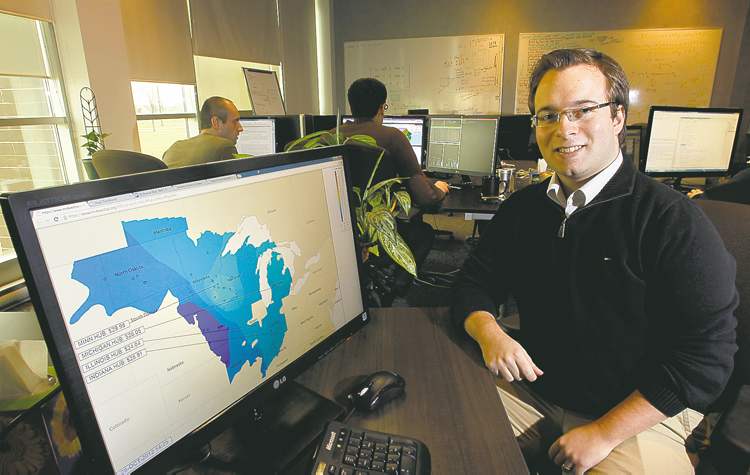Powerful computing
Resourceful firm helps electric utilities
Advertisement
Read this article for free:
or
Already have an account? Log in here »
To continue reading, please subscribe:
Monthly Digital Subscription
$1 per week for 24 weeks*
- Enjoy unlimited reading on winnipegfreepress.com
- Read the E-Edition, our digital replica newspaper
- Access News Break, our award-winning app
- Play interactive puzzles
*Billed as $4.00 plus GST every four weeks. After 24 weeks, price increases to the regular rate of $19.00 plus GST every four weeks. Offer available to new and qualified returning subscribers only. Cancel any time.
Monthly Digital Subscription
$4.75/week*
- Enjoy unlimited reading on winnipegfreepress.com
- Read the E-Edition, our digital replica newspaper
- Access News Break, our award-winning app
- Play interactive puzzles
*Billed as $19 plus GST every four weeks. Cancel any time.
To continue reading, please subscribe:
Add Free Press access to your Brandon Sun subscription for only an additional
$1 for the first 4 weeks*
*Your next subscription payment will increase by $1.00 and you will be charged $16.99 plus GST for four weeks. After four weeks, your payment will increase to $23.99 plus GST every four weeks.
Read unlimited articles for free today:
or
Already have an account? Log in here »
Hey there, time traveller!
This article was published 30/10/2012 (4737 days ago), so information in it may no longer be current.
It can be a little overwhelming for young people to even imagine having some impact on serious global issues like saving the planet from environmental disaster.
How can they muster enough knowledge and resources to make a difference?
But one of the reasons Matthew Hudson was able to form his company, Invenia, in 2006 when he was only 23, was because others had already assembled resources he thought he could piggyback on.

Invenia does sophisticated modelling and forecasting of wind- and solar-power generation for electrical utilities using artificial intelligence and patented pattern-recognition algorithms.
The information helps utilities make decisions on when they need to top up reserves from fossil-fuel power stations and when they can count on enough wind and solar power to satisfy the needs of the grid.
Producing the kind of intelligence Invenia offers its clients requires massive amounts of computing power.
As a small company with about 15 employees that operates out of the business incubator facility at the University of Manitoba’s Smartpark, Invenia can’t afford the required warehouse full of computers.
That’s where cloud computing comes in.
“We are effectively accessing tens of millions of dollars of infrastructure available on demand for hourly rental,” Hudson said. “So rather than having to raise massive amounts of capital to buy all the equipment and then try to figure out how to manage a data centre and not operate it inefficiently, we can leverage someone else’s expertise in managing data centres and have massive computing power.”
Invenia was awarded the Most Innovative Business in Canada Canadian Youth Business Foundation Award in 2011. It now has customers across North America, the United Kingdom and South Africa and is experiencing triple-digit growth.
Hudson has attracted a smart team, including two current PhD candidates, and he said their artificial-intelligence technology is helping electrical utilities more efficiently manage their power needs.
“Our ability to access data centres around the world, combined with our “bleeding edge” machine-learning (or artificial intelligence) technology…. now we’re talking about something with global impact and global reach,” he said.
Its Energy Intelligence System (EIS) for wind- and solar-power forecasting, integration and trading increases the efficiency of the smart grid through improved operations. Last year, Hudson figures, Invenia helped prevent 55,000 tonnes of CO2 emissions through its wind-power forecasting technology.
“Although some challenges exist with managing a variable energy source such as wind, utilities all around the world continue to recognize the value wind energy can play within a larger interconnected electrical transmission system,” said Ulrike Kucera, spokeswoman for the Canadian Wind Energy Association.
Modern energy forecasting is one way sustainable and economic use of wind energy can be addressed.
martin.cash@freepress.mb.ca



